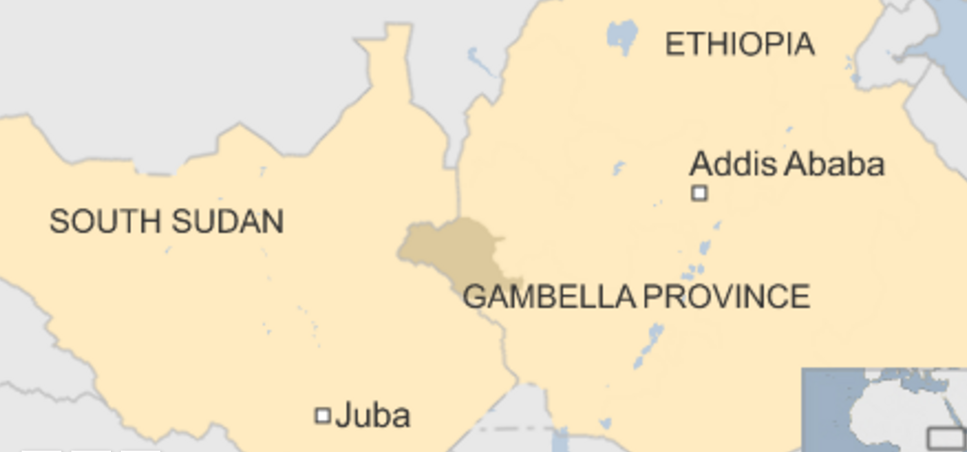Living conditions for refugees in Ethiopia’s Gambella region are rapidly deteriorating following significant cuts to humanitarian aid.
The sharp decline is largely due to global reductions in support from key donors such as USAID, straining basic services such as food distribution, health care, access to clean water, and sanitation provision.
Located in southwestern Ethiopia near the South Sudanese border, Gambella has hosted a large number of mostly South Sudanese refugees since 2014. Today, more than 395,000 refugees were living in seven camps, including Kule, where Médecins Sans Frontières (MSF) has provided health care services for more than a decade.
The general decline of humanitarian funding in the region has led to the suspension of nutrition services in four out of the seven refugee camps, leaving around 80,000 children under the age of five at risk of life-threatening malnutrition.
“We receive food once a month—maize, wheat, and sorghum—but it always runs out before the month ends,” says Nyauahial Puoch, a mother who traveled about 8km from Tierkidi Refugee Camp to seek treatment for her 17-month-old daughter at Kule.
“Since last year, there has been a big decline. Some of the items we used to get are no longer provided at all,” Puoch said.
Her daughter was diagnosed with malnutrition.
Since October 2024, refugees at Kule have received as little as 600 calories a day—less than 30 percent of the recommended daily minimum of 2,100 calories per person. Other refugee camps in the region were also experiencing a similar situation. At times, food distribution stops for months due to international supply chain disruptions and funding shortages.
MSF has this year recorded a 55 percent increase in child admissions to its therapeutic feeding center, compared to the previous year, with half of the children coming from other camps in the region.
“We walked three hours from our home in Akula camp to get to the MSF hospital,” said Kuoth, whose one-year-old child received treatment at MSF’s Kule hospital.
“Our child had a cough, diarrhea, and severe malnutrition and she had to be hospitalized for 15 days until she recovered,” said Kuoth.
MSF’s outpatient department has seen a 58 percent rise in patient visits, compared to the same period last year, with many arriving from surrounding camps. The number of women attending antenatal care sessions has also increased by 72 percent compared to 2024.
“We’re receiving more patients from other camps,” says MSF’s Gambella project coordinator Armand Dirks.
“Largely because these services are no longer available locally due to many NGO’s withdrawing from the region due to funding cuts. MSF is overwhelmed by the increased patient load, and we fear this number will likely keep rising in the coming months.”
Funding cuts have also forced activities such as malaria prevention programs to be downsized.
As malaria is endemic in the region, MSF’s team was anticipating a sharp increase in the number of patients during the current rainy season, which lasts from May to October.
Last month, the number of malaria patients coming to MSF’s facility rose by approximately 125percent, compared to June. MSF has treated more than 23,800 cases since January, with over half of the patients coming from neighboring refugee camps.
With key malaria prevention activities such as the distribution of bed nets, indoor and outdoor spraying, and timely access to health care services being significantly decreased this year, MSF fears that the region will have a hard time controlling the spread of the disease, which will potentially increase the burden on the already fragile health system.
“Cases are expected to rise sharply during this peak transmission period,” said MSF’s deputy medical coordinator Birhanu Sahile
“This poses a serious threat to already vulnerable refugees who face heightened exposure to malaria-infected mosquitos due to overcrowded living conditions and limited sanitation.”
To address this situation, MSF was enhancing its malaria treatment services and plans to establish a dedicated Malaria Health Post in Tierkidi—a large refugee camp in Gambella, home to more than 74,000 refugees.
MSF teams were also distributing bed nets and supporting vector control and preventive measures for refugees at the Kule camp.
“Walking through the camp, you’ll see many empty buildings—spaces once used by NGOs that have now withdrawn,” said Dirks.
“Their absence is deeply felt. Services that once supported this community have now disappeared.”
At Kule, MSF was providing a range of essential services including primary and secondary health care, maternal and child health including comprehensive sexual and gender-based violence care, mental health care, water and sanitation, and health promotion and nutrition programs.
“MSF is working at full capacity, but the scale of needs in Kule far exceeds what we can address alone,” said Birhanu.
“Without urgent support and interventions from other actors, this crisis will continue to escalate, putting thousands of vulnerable lives at even greater risk.”
MSF was urging the Government of Ethiopia to take decisive steps in Gambella to advance refugee integration into local services as NGOs were increasingly unable to meet their healthcare needs.




